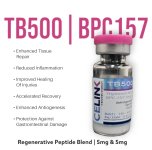Musmadar
Member
- Messages
- 45
- Reaction score
- 97
- Points
- 18
Thymosin Beta-4 (TB-500) is a peptide with remarkable healing and regenerative properties that has captured the interest of researchers and individuals seeking to optimize recovery and tissue repair. TB-500 is derived from the naturally occurring thymosin beta-4, a protein crucial for cell proliferation, migration, and differentiation.
One of the most notable attributes of TB-500 is its potential in promoting tissue repair and regeneration. This peptide plays a key role in wound healing by stimulating cellular migration to the site of injury. It facilitates the recruitment of various cell types, including fibroblasts and endothelial cells, fostering a regenerative environment essential for tissue recovery.
TB-500's impact extends beyond wound healing to muscle repair and recovery. Athletes and individuals engaged in strenuous physical activities often turn to TB-500 to accelerate muscle healing, reduce inflammation, and enhance overall recovery. By promoting angiogenesis, the formation of new blood vessels, TB-500 helps improve blood flow to injured or stressed tissues, delivering essential nutrients and oxygen for optimal healing.
Moreover, TB-500 demonstrates anti-inflammatory properties, which contribute to its therapeutic potential. Inflammation is a natural response to tissue damage, but excessive or prolonged inflammation can hinder the healing process. TB-500's ability to modulate inflammatory responses may help maintain a balanced environment, allowing for effective healing without unnecessary complications.
The versatility of TB-500 is further underscored by its potential in treating various injuries, including ligament and tendon injuries. Research suggests that TB-500 can promote collagen deposition and enhance the structural integrity of connective tissues, supporting their repair and minimizing the risk of re-injury.
It's important to note that while TB-500 shows promise in the realm of regenerative medicine, its use and efficacy are subjects of ongoing research. As with any peptide or pharmaceutical, the responsible and informed use of TB-500 should involve consultation with healthcare professionals to ensure safety and appropriateness for individual circumstances.
In conclusion, Thymosin Beta-4 (TB-500) holds significant promise as a therapeutic peptide with regenerative properties. Its ability to promote tissue repair, accelerate muscle healing, modulate inflammation, and support recovery from various injuries underscores its potential applications in the field of regenerative medicine. As research continues, TB-500 may emerge as a valuable tool in optimizing healing and enhancing overall tissue health.
One of the most notable attributes of TB-500 is its potential in promoting tissue repair and regeneration. This peptide plays a key role in wound healing by stimulating cellular migration to the site of injury. It facilitates the recruitment of various cell types, including fibroblasts and endothelial cells, fostering a regenerative environment essential for tissue recovery.
TB-500's impact extends beyond wound healing to muscle repair and recovery. Athletes and individuals engaged in strenuous physical activities often turn to TB-500 to accelerate muscle healing, reduce inflammation, and enhance overall recovery. By promoting angiogenesis, the formation of new blood vessels, TB-500 helps improve blood flow to injured or stressed tissues, delivering essential nutrients and oxygen for optimal healing.
Moreover, TB-500 demonstrates anti-inflammatory properties, which contribute to its therapeutic potential. Inflammation is a natural response to tissue damage, but excessive or prolonged inflammation can hinder the healing process. TB-500's ability to modulate inflammatory responses may help maintain a balanced environment, allowing for effective healing without unnecessary complications.
The versatility of TB-500 is further underscored by its potential in treating various injuries, including ligament and tendon injuries. Research suggests that TB-500 can promote collagen deposition and enhance the structural integrity of connective tissues, supporting their repair and minimizing the risk of re-injury.
It's important to note that while TB-500 shows promise in the realm of regenerative medicine, its use and efficacy are subjects of ongoing research. As with any peptide or pharmaceutical, the responsible and informed use of TB-500 should involve consultation with healthcare professionals to ensure safety and appropriateness for individual circumstances.
In conclusion, Thymosin Beta-4 (TB-500) holds significant promise as a therapeutic peptide with regenerative properties. Its ability to promote tissue repair, accelerate muscle healing, modulate inflammation, and support recovery from various injuries underscores its potential applications in the field of regenerative medicine. As research continues, TB-500 may emerge as a valuable tool in optimizing healing and enhancing overall tissue health.


